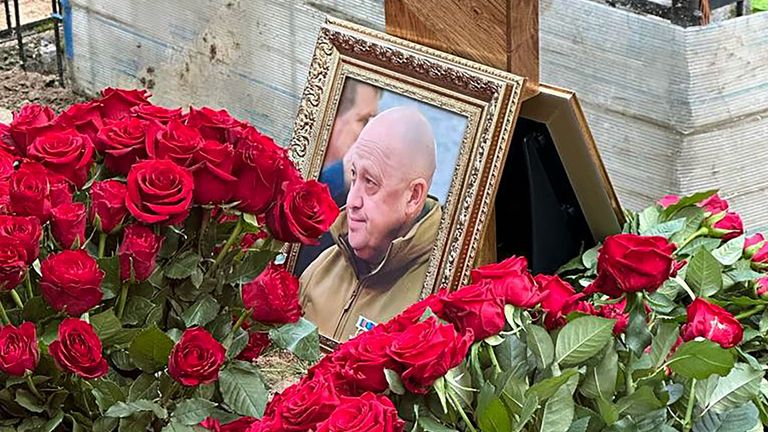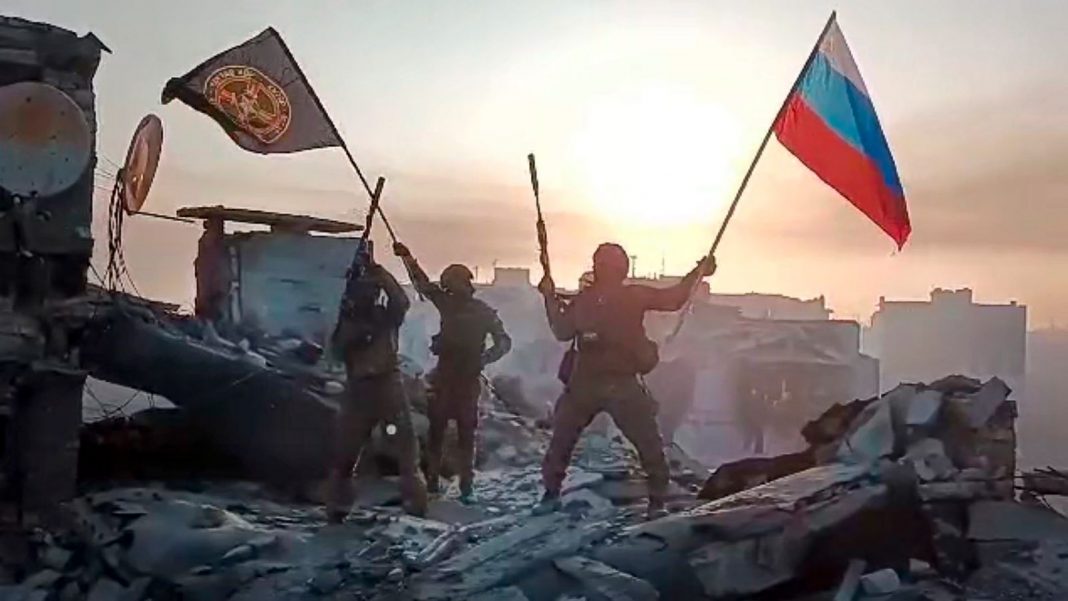Today marks the first anniversary of Yevgeny Prigozhin’s march on Moscow with his Wagner mercenaries.
It was an unprecedented challenge to Vladimir Putin’s authority.
There had never been anything like it in nearly a quarter of a century’s rule.
And yet, 12 months on, it seems the Russian president’s grip on power is stronger than ever. He’s just started another six-year term as leader, having been elected with 87% of the vote, according to official results.
So how did that turnaround happen and where is Wagner now?
A statue of Yevgeny Prigozhin at his grave

Pic: STR/EPA-EFE/Shutterstock
Calculated response
“His approach of how to deal with this problem was actually quite subtle,” Andrei Soldatov, a journalist and expert on Russia’s security services, told Sky News.
Whatever the miscalculations that led to the uprising, Putin is still tactically “very smart”, he added.
“He didn’t immediately counter attack all those he believed supportive [of Prigozhin], instead he tried to show that actually nothing really bad is happening.”
There was no immediate purge or punishment. Watching events unfold from London, I remember thinking that seemed odd at the time. A sign of weakness perhaps.
Not so, according to Mr Soldatov, who believes it was a calculated response to avoid giving the moment oxygen and risk adding to its significance.
“If you deny something exists, you don’t need to respond, right? You don’t need to have a reaction,” he said.
“It’s how you cope with fear.”

Vladimir Putin
It certainly seems to have worked. At least from our experience filming in Moscow this week, it appears many Russians aren’t even aware the event happened.
Hidden from public view
At an informal memorial to Wagner fighters in one of the side streets off the Red Square, there are photos of fallen fighters, including Prigozhin, as well as several flags bearing the group’s trademark skull-and-crossed-bones tied to a fence.

A memorial set up to Wagner Group fighters
We spoke to a number of people who stopped to take it in, yet the majority didn’t know what we were talking about when we mentioned the mutiny.
That might seem hard to believe, but don’t forget, the media here is all state-run.
The attempted uprising might have been leading news bulletins back in Britain, but not here.
‘Putin’s learnt lessons’
But it seems that was only one part of the strategy.
When it came to dealing with dissenting voices from the pro-war side – who, like Prigozhin, didn’t think the Kremlin was going hard enough in Ukraine – Putin wanted to send a much stronger signal, say analysts.
“What we saw in the months that followed was a much more concerted cracking down on the most militaristic critics of Putin,” said Nigel Gould-Davies, senior fellow for Russia and Eurasia at the International Institute for Strategic Studies.
Prominent nationalist Igor Girkin, for example, was arrested in July, shortly after the mutiny, on extremism charges.
The former rebel commander played a key role in the annexation of Crimea in 2014 but was jailed for four years in January.
“[Putin’s] learnt lessons,” Mr Gould-Davies said.
“He’s learnt it’s not safe to keep, as it were, right-wing critics around.”
Security service purge
And then there was Prigozhin himself, of course. He died in a plane crash in August last year while flying from Moscow to St Petersburg.
The cause of the crash is still unexplained.
As for his army of ex-convicts and mercenaries, it was quickly brought under the Kremlin’s control. Many joined the army, the national guard or other private military groups.
What was left of Wagner itself was rebranded as Russia’s Africa Corps, and it now operates there.
There has also been a flurry of recent activity within the ministry of defence, with several senior figures arrested on corruption charges in the last couple of months – an attempt to “re-establish [Putin’s] complete control”, according to Mr Soldatov.
The trigger seems to have been the removal of Sergei Shoigu as minister of defence, opening the doors to a full-on purge of the top brass by the security services.
Read more from Sky News:
Russia hits Ukrainian energy facilities
The two theories behind Putin’s North Korea visit
Russia’s latest threat is troubling – Putin’s words feel like a step up

Sergei Shoigu. Pic: Reuters
Ironic, you might think, considering Shoigu was often the target of Prigozhin’s countless expletive-laden tirades posted on social media.
That said, the memory of neither Wagner nor Prigozhin has been erased.
The makeshift memorial is a case in point, as is Prigozhin’s grave in St Petersburg.
At the beginning of this month, to mark Prigozhin’s birthday, a huge, bronze statue of him was unveiled next to where he’s buried in Porokhovskoye Cemetery.
In the short time we were there, several mourners came to pay their respects, including one man from Belgorod, a region that borders Ukraine.
He told us that had Prigozhin run for president, he believes 90% of residents there would have voted for him.

Keep up with all the latest news from the UK and around the world by following Sky News
That’s pretty extraordinary for a man that was labelled a traitor by the actual president.
And it’s not just those in Belgorod who apparently view the catering-tycoon-turned-warlord as a hero.
His grave has become a pseudo shrine.
Cash, cigarettes and chocolates were among the items left by mourners, alongside hundreds of roses and carnations.
But does this undermine Putin’s authority?
I don’t think so, in fact quite the opposite. One could argue the existence of both the graveside statue and the memorial (in sight of the Kremlin) almost trivialises them.
Perhaps more telling, is the fact none of the people we encountered – in St Petersburg and Moscow – would speak on camera.
Even off camera, they declined to give their name. And that speaks volumes about the current climate in Russia.







